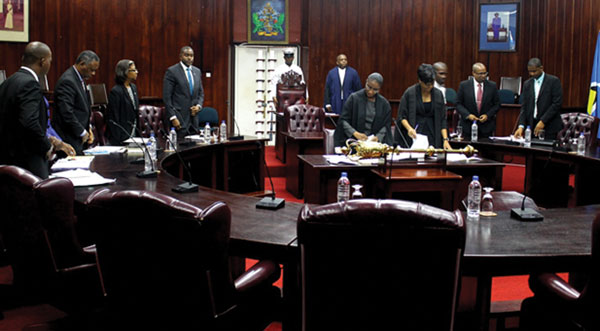“While the MPs were squaring-off in the House over the figures and related important issues (like debt management, borrowing and payback concerns and the projected impact of the estimates on the cost of living), most people had other things in mind.”
‘Budget is boring!’
That’s the ready average response to the annual exercise in public accounting and accountability that annual presentations of Government Estimates of Revenue and Expenditure are supposed to be.
It’s been that way for quite some time, as the ways and means of presentation are so mired in set colonial pomp and parliamentary procedure that the average Joan and John Public has never been able to understand it all well enough to truly judge how their taxes are being spent, exactly what the government is doing with the country’s money, how much debt is really owed in all — and how the more money being borrowed will finally be paid.
Since independence, financial and accounting jargon, statistical comparative analyses and other variations of the sheer elasticity of budgetary language are always employed to play their respective parts in every minister of finance’s budget presentation here.
As a result, so far removed have most people felt from the accountability part of the annual parliamentary exercise that those who do pay attention look forward more to the debate between the opposing sides than to the figures being debated.
Historically, successive UWP administrations have mainly depended on their parliamentary majorities to present whatever budget has already been crafted, hardly listening to or accommodating opposition complaints.
Successive Labour administrations, on the other hand, have been both chided and applauded for appearing to be too overly interested in delivering government goodies in constituencies that didn’t vote SLP.
Same with efforts by governments to make the annual budget exercise more simple and people-friendly: UWP administrations have been largely satisfied with maintaining the status quo and Labour governments introduced new approaches which were supposed to make the process more meaningful, accountable and transparent.
But never mind the changes (by both major parties in office), the budget presentation remains an exercise bigger in style, form and delivery than in satisfactory public attention, interest and/or consumption.
Take the 2019-2020 budget; while the MPs were squaring-off in the House over the figures and related important issues (like debt management, borrowing and payback concerns and the projected impact of the estimates on the cost of living), most people had other things in mind.
And not only ‘The people’…
The leading news headlines and social media comments for most of the past week, for example, were not from this year’s budget, but more about items associated with unanswered questions about whether Senator Ubaldus Raymond had actually ‘resigned’ from the Cabinet of Ministers, who requested his resignation, whether he resigned willingly, whether he was truly being ‘investigated’, how long the investigations might take, whether investigations can be completed without ‘evidence’ — and whether the announced investigation was ‘a blackout’ or ‘a whitewash’.
While the ministers and opposition MPs debated which side handles public monies better, most people seemed more interested in the salubrious (‘roro’) aspects of this second below-the-belt, close-up, private encounter gone public involving the Senator-on-Leave and women without matrimonial connections to have gone viral, each attracting enough public attention to draw official top-level responses involving ‘investigations’.
The women MPs in both houses have kept their parliamentary lips quite sealed on the issue(s), but many women outside were indeed joining the debate over ‘whether a politician’s private life is any of the public’s business’, whether ‘a man should be blamed for chatting a woman’, whether anything the senator/minister is alleged to have said or done ‘resulted in any economic or financial costs to the country’, whether any of the accusers ‘haven’t ever done the same thing(s)’ — and ‘which sinner will cast the first stone.’
Not that the public discussion about the minister’s private behaviour is any less important than how taxpayers money is spent, as each are important elements in the general debate on gubernatorial transparency and accountability.
The extent to which many have gone to split hairs to offer bald, unconvincing cock-and-bull partisan political arguments to explain or justify their positions for or against whether the minister should have any questions to answer can sometimes be both surprising and regretful — especially in a country that boasts the highest number of Nobel Laureates per head of population in the entire world.
But then, with everyone so sensitive these days (You’d swear an election is on the horizon), one also has to be that more careful and selective about labels being employed and analytical comparisons being made of the differences in levels of public attention paid to the Budget 2019-2020 presentation versus the minister’s saucy stories — lest one be accused of literally engaging in literary elasticity, arriving at analytical conclusions based on gross mathematical miscalculation, or engaging in purely intended statistical demagoguery, with calculated margins of equal error.
Do the Maths, dear reader – and (try your best to) subtract the politics!













